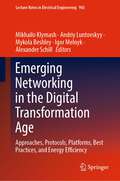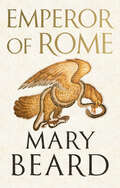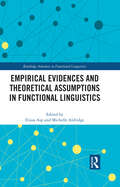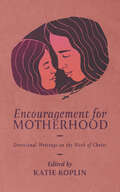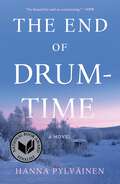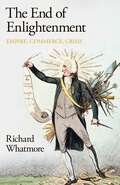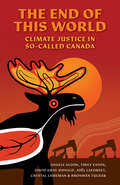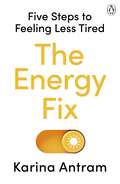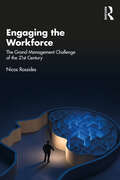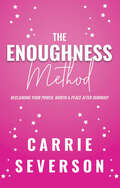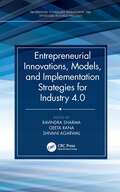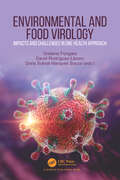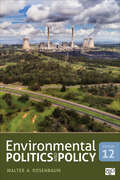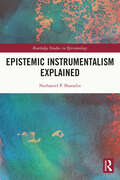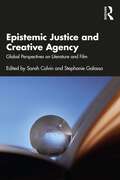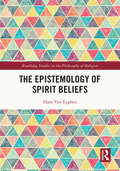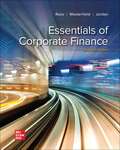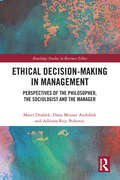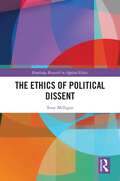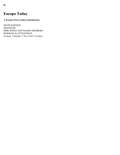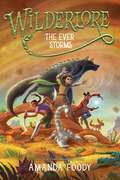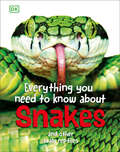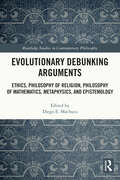- Table View
- List View
Emerging Networking in the Digital Transformation Age: Approaches, Protocols, Platforms, Best Practices, and Energy Efficiency (Lecture Notes in Electrical Engineering #965)
by Mikhailo Klymash Andriy Luntovskyy Mykola Beshley Igor Melnyk Alexander SchillThis book covers a range of leading-edge topics. It is suitable for teaching specialists for advanced lectures in the domains of systems architecture and distributed platforms. Furthermore, it serves as a basis for undergraduates as well as an inspiration for interesting postgraduates, looking for new challenges. It addresses a holistic view of QoS, which becomes nowadays via Digital Transformations less technically and more socially driven. This includes IoT, energy efficiency, secure transactions, blockchains, and smart contracting. Under the term Emerging Networking (EmN), we cover the steadily growing diversity of smart mobile and robotic apps and unmanned scenarios (UAV). EmN supports distributed intelligence across the combined mobile, wireless, and fixed networks in the edge-to-cloud continuum. The 6G driving factors and potentials in the mid-term are examined. Operative (emergency) networking, which assists rescue troops at sites, also belongs to the above-mentioned problems. The EmN architecture includes the components of SDN, blockchain, and AI with efficient slicing and cloud support. The design peculiarities in dynamically changing domains, such as Smart Shopping/Office/Home, Context-Sensitive Intelligent apps, are discussed. Altogether, the provided content is technically interesting while still being rather practically oriented and therefore straightforward to understand. This book originated from the close cooperation of scientists from Germany, Ukraine, Israel, Switzerland, Slovak Republic, Poland, Czech Republic, South Korea, China, Italy, North Macedonia, Azerbaijan, Kazakhstan, France, Latvia, Greece, Romania, USA, Finland, Morocco, Ireland, and the United Kingdom. We wish all readers success and lots of inspiration from this useful book!
Emperor of Rome: Ruling The Ancient Roman World
by Mary BeardINSTANT NEW YORK TIMES BESTSELLER Best Books of 2023: New Yorker, The Economist, Smithsonian Most Anticipated Books of Fall: Washington Post, Los Angeles Times, TODAY, Literary Hub, and Publishers Weekly "A vivid way to re-examine what we know, and don’t, about life at the top.... Emperor of Rome is a masterly group portrait, an invitation to think skeptically but not contemptuously of a familiar civilization." —Kyle Harper, Wall Street Journal A sweeping account of the social and political world of the Roman emperors by “the world’s most famous classicist” (Guardian). In her international bestseller SPQR, Mary Beard told the thousand-year story of ancient Rome, from its slightly shabby Iron Age origins to its reign as the undisputed hegemon of the Mediterranean. Now, drawing on more than thirty years of teaching and writing about Roman history, Beard turns to the emperors who ruled the Roman Empire, beginning with Julius Caesar (assassinated 44 BCE) and taking us through the nearly three centuries—and some thirty emperors—that separate him from the boy-king Alexander Severus (assassinated 235 CE). Yet Emperor of Rome is not your typical chronological account of Roman rulers, one emperor after another: the mad Caligula, the monster Nero, the philosopher Marcus Aurelius. Instead, Beard asks different, often larger and more probing questions: What power did emperors actually have? Was the Roman palace really so bloodstained? What kind of jokes did Augustus tell? And for that matter, what really happened, for example, between the emperor Hadrian and his beloved Antinous? Effortlessly combining the epic with the quotidian, Beard tracks the emperor down at home, at the races, on his travels, even on his way to heaven. Along the way, Beard explores Roman fictions of imperial power, overturning many of the assumptions that we hold as gospel, not the least of them the perception that emperors one and all were orchestrators of extreme brutality and cruelty. Here Beard introduces us to the emperor’s wives and lovers, rivals and slaves, court jesters and soldiers, and the ordinary people who pressed begging letters into his hand—whose chamber pot disputes were adjudicated by Augustus, and whose budgets were approved by Vespasian, himself the son of a tax collector. With its finely nuanced portrayal of sex, class, and politics, Emperor of Rome goes directly to the heart of Roman fantasies (and our own) about what it was to be Roman at its richest, most luxurious, most extreme, most powerful, and most deadly, offering an account of Roman history as it has never been presented before.
Empirical Evidences and Theoretical Assumptions in Functional Linguistics (Routledge Advances in Functional Linguistics)
by Elissa AspThis collection explores the relationships between theory and evidences in functional linguistics, bringing together perspectives from both established and emerging scholars. The volume begins by establishing theoretical common ground for functional approaches to language, critically discussing empirical inquiry in functional linguistics and the challenges and opportunities of using new technologies in linguistic investigations. Building on this foundation, the second part of the volume explores the challenges involved in using different data sources as evidence for theorizing language and linguistic processes, drawing on work on lexical cohesion in language variation, neuroimaging and neuropathological data, and keystroke logging and eye-tracking. The final section of the volume examines the ways in which evidences from a wide range of data sources can offer new perspectives toward challenging established theoretical claims, employing empirical evidences from corpus linguistic analysis, keystroke logging, and multimodal communication. This pioneering collection synthesizes perspectives and addresses fundamental questions in the investigation of the relationships between theory and evidences in functional linguistics and will be of particular interest to researchers working in the field, as well as linguists working in experimental and interdisciplinary approaches which seek to bridge this gap.
Encouragement for Motherhood: Devotional Writings on the Work of Christ
by CollectiveBeing a mom is hard work! Few of us find that motherhood is what we expected it to be. We mothers all need a little encouragement now and then to get us through the days when things feel a little too difficult and we' re not feeling the joy in our vocation. This book offers that encouragement, rooted in and focused on Christ. We' re reminded of the work of Christ and the reality that he has established the work of our hands brings hope, peace, and sustainability to our work as mother. Encouragement for Motherhood is honest about the struggles of motherhood. Each contributor's words are vulnerable and honest about pieces of their work as mothers. The authors write about their limitations, fear of the future, failures, and relationship dynamics. More importantly, each contributor points to the hope found amid the struggles of motherhood. The hope found is not within the mother. The hope found is freely given to each of us by Christ. Encouragement for Motherhood will not give you 30 tips and tricks to a more successful motherhood. What it provides is the gospel reminder that you are forgiven and free on account of Christ and his work. Being kept in those unfailing promises of Christ we get to live in freedom. Living in freedom we will fail and ask forgiveness, be confronted by our limitations but held by God, and be fearful yet rest in Christ.
The End of Drum-Time: A Novel
by Hanna PylväinenFINALIST FOR THE 2023 NATIONAL BOOK AWARDAn epic love story in the vein of Cold Mountain and The Great Circle, about a young reindeer herder and a minister’s daughter in the nineteenth century Arctic Circle In 1851, at a remote village in the Scandinavian tundra, a Lutheran minister known as Mad Lasse tries in vain to convert the native Sámi reindeer herders to his faith. But when one of the most respected herders has a dramatic awakening and dedicates his life to the church, his impetuous son, Ivvár, is left to guard their diminishing herd alone. By chance, he meets Mad Lasse’s daughter Willa, and their blossoming infatuation grows into something that ultimately crosses borders—of cultures, of beliefs, and of political divides—as Willa follows the herders on their arduous annual migration north to the sea.Gorgeously written and sweeping in scope, Hanna Pylväinen's The End of Drum-Time immerses readers in a world lit by the northern lights, steeped in age-old rituals, and guided by passions that transcend place and time.
The End of Enlightenment: Empire, Commerce, Crisis
by Richard Whatmore'A brilliant and revelatory book about the history of ideas' David Runciman 'Fascinating and important' Ruth Scurr The Enlightenment is popularly seen as the Age of Reason, a key moment in human history when ideals such as freedom, progress, natural rights and constitutional government prevailed. In this radical re-evaluation, historian Richard Whatmore shows why, for many at its centre, the Enlightenment was a profound failure.By the early eighteenth century, hope was widespread that Enlightenment could be coupled with toleration, the progress of commerce and the end of the fanatic wars of religion that were destroying Europe. At its heart was the battle to establish and maintain liberty in free states – and the hope that absolute monarchies such as France and free states like Britain might even subsist together, equally respectful of civil liberties. Yet all of this collapsed when states pursued wealth and empire by means of war. Xenophobia was rife and liberty itself turned fanatic.The End of Enlightenment traces the changing perspectives of economists, philosophers, politicians and polemicists around the world, including figures as diverse as David Hume, Adam Smith, Edmund Burke and Mary Wollstonecraft. They had strived to replace superstition with reason, but witnessed instead terror and revolution, corruption, gross commercial excess and the continued growth of violent colonialism.Returning us to these tumultuous events and ideas, and digging deep into the thought of the men and women who defined their age, Whatmore offers a lucid exploration of disillusion and intellectual transformation, a brilliant meditation on our continued assumptions about the past, and a glimpse of the different ways our world might be structured - especially as the problems addressed at the end of Enlightenment are still with us today.
The End of This World: Climate Justice in So-Called Canada
by Angele Alook Emily Eaton David Gray-Donald Joël Laforest Crystal Lameman Bronwen TuckerThe climate crisis is here, and the end of this world—a world built on land theft, resource extraction, and colonial genocide—is on the horizon. In this compelling roadmap to a livable future, Indigenous sovereignty and climate justice go hand in hand. Drawing on their work in Indigenous activism, the labour movement, youth climate campaigns, community-engaged scholarship, and independent journalism, the six authors challenge toothless proposals and false solutions to show that a just transition from fossil fuels cannot succeed without the dismantling of settler capitalism in Canada. Together, they envision a near future where oil and gas stay in the ground; where a caring economy provides social supports for all; where wealth is redistributed from the bloated billionaire class; and where stolen land is rightfully reclaimed under the jurisdiction and sovereignty of Indigenous peoples. Packed with clear-eyed analysis of both short- and long-term strategies for radical social change, The End of This World promises that the next world is within reach and worth fighting for.
The Energy Fix: Five Steps to Feeling Less Tired
by Karina AntramFeeling tired but don't know why? This is the book anyone battling low energy needs to read.'It's a cracking book, a cracking, cracking book' Chris Evans, Virgin Radio The Energy Fix is a nutritional science book that will help you to understand why your energy levels are so low and equip you with easy, practical, everyday strategies for boosting it. Drawing on scientific research and the author’s nutritional expertise, this simple five-step approach shows how to reinvigorate and stabilise your energy levels for good: 1. Fuel your body 2. Nourish your gut 3. Supercharge your sleep and exercise 4. Power up with supplements 5. Harness the power of your mindWith The Energy Fix you can learn how to listen and respond to your body so that you never feel tired again.'This practical five-step guide to tackling tiredness combines coaching-based methodologies, useful reflections, tips and lifestyle changes' Your Healthy Living'Simple tips to boost your energy levels' The Times*Previously published as Fix Your Fatigue*
Engaging the Workforce: The Grand Management Challenge of the 21st Century
by Nicos RossidesGrounded in 25 years of research and practical experience, this book shows how to create engaging work environments and practices that harness employees’ energy and talents toward achieving organizational goals, while enhancing workers’ motivation and well-being.Creating and sustaining high functioning work environments lies at the core of management practice, and employee engagement is a key element in shaping these workplaces – and a significant challenge for business leaders. Academic researchers and practitioners have tackled the topic, but a chasm exists between these perspectives: academics tend to emphasize theory over problem-solving, while practitioners tend to rely on formulaic approaches and experience, rather than empirically tested theoretical frameworks. Thought leader, accomplished CEO, and organizational development consultant Nicos Rossides bridges this gap, exploring the complexity and fragmented nature of the academic literature and offering insight into practitioner approaches used by research and consulting organizations. He also presents his own conceptual framework that he has built over the years and is meant to be customized to specific organizational contexts.This insightful book will be of great interest to CEOs, board members and line managers across industries, as well as HR/OD practitioners and students, especially those who wish to learn how to apply time-tested intervention strategies to the workforce engagement challenge.
The Enoughness Method: Reclaiming Your Power, Worth, and Peace After Burnout
by Carrie SeversonThe author of Unapologetically Enough: Reshaping Success & Self-Love, Carrie Severson, a self-diagnosed burnout, gives readers the steps to recover from burnout in this guided journal. The Enoughness Method: Reclaiming Your Power, Worth, and Peace After Burnout gives readers a simple three-step blend of self-care and nervous system exercises. In addition, readers gain access to journal prompts and are encouraged to explore their inner dialogue while developing strategies for self-compassion. You need The Enoughness Method if you can answer YES to the following three questions: •Have you lost your passion for your career? •Are you willing to negotiate your daily expectations? •Are you open to finding more peace in life? Severson shares her experience of how creating The Enoughness Method helped her recover from burnout and find a healthier way of living. Burnout impacts our physical, mental, emotional, and spiritual health and steals our joy, happiness, sense of worth, and peace. The Enoughness Method is your solution to reclaiming it all back.
Entrepreneurial Innovations, Models, and Implementation Strategies for Industry 4.0 (ISSN)
by Ravindra Sharma Geeta Rana Shivani AgarwalThis book explores the link between entrepreneurship and innovation, providing an understanding of the latest developments in the field. It explores numerous challenges to entrepreneurship, such as failures and socio-economic issues, and presents concepts, models, and implementation strategies for Industry 4.0.Industry 4.0 presents unique challenges and unique opportunities to entrepreneurs. Social, techno, and women’s entrepreneurship, among other business sectors and domains, are discussed in this new context. This book highlights the strategies of successful start-up organizations, focusing on the most critical factors for starting a new enterprise in today’s business environment, and provides efficient remedies for common problems. These strategies and solutions will help build a sustainable development model for developing economies and contribute to a global awareness of the entrepreneurship environment.Entrepreneurial Innovations, Models, and Implementation Strategies for Industry 4.0 is both a practical guide for new entrepreneurs to establishing start-ups and an enlightening collection of research for graduate students, postgraduate students, scholars, and academicians across all disciplines. Policymakers will also benefit from this book’s understanding of entrepreneurial ecosystems and their applications.
Environmental and Food Virology: Impacts and Challenges in One Health Approach
by Gislaine Fongaro David Rodr Doris Sobral Marques SouzaEnteric pathogenic viruses are a major challenge in public health, as they represent a major concern with a severe global impact to the economy, commerce, and health systems. Consequently, their active monitoring can allow preventive surveillance and the discovery of new viruses, exemplifying an important epidemiological and health control tool.In an unprecedented way, this book addresses the general characteristics of enteric viruses and their environmental transmission, with a particular emphasis on their structures, stability, routes of transmission and the use of bioindicators for epidemiological monitoring and control. In addition, this book will also address the recent developments for viral concentration and detection in environmental and food samples and the challenges for the control of environmental and food viruses to reduce microbiological risk for final consumers.
Environmental Politics and Policy
by Walter A. RosenbaumWalter A. Rosenbaum′s classic Environmental Politics and Policy, Twelfth Edition, provides definitive coverage of environmental politics and policy, lively case material, and a balanced assessment of current environmental issues. The newly streamlined first half of the book sets needed context and describes the policy process, while the second half covers specific environmental issues such as air and water, toxic and hazardous substances, energy, and global policymaking on issues like climate change and trans-boundary politics. The Twelfth Edition includes updated case studies and a look at the transition in environmental policies between the Trump and Biden administrations, offering students a current and relevant look at the continuing challenge of reconciling sound science with practical politics.
Environmental Politics and Policy
by Walter A. RosenbaumWalter A. Rosenbaum′s classic Environmental Politics and Policy, Twelfth Edition, provides definitive coverage of environmental politics and policy, lively case material, and a balanced assessment of current environmental issues. The newly streamlined first half of the book sets needed context and describes the policy process, while the second half covers specific environmental issues such as air and water, toxic and hazardous substances, energy, and global policymaking on issues like climate change and trans-boundary politics. The Twelfth Edition includes updated case studies and a look at the transition in environmental policies between the Trump and Biden administrations, offering students a current and relevant look at the continuing challenge of reconciling sound science with practical politics.
Epistemic Instrumentalism Explained (Routledge Studies in Epistemology)
by Nathaniel SharadinDo epistemic requirements vary along with facts about what promotes agents' well-being? Epistemic instrumentalists say 'yes', and thereby earn a lot of contempt. This contempt is a mistake on two counts. First, it is incorrectly based: the reasons typically given for it are misguided. Second, it fails to distinguish between first- and second-order epistemic instrumentalism; and, it happens, only the former is contemptible.In this book, Nathaniel P. Sharadin argues for rejecting epistemic instrumentalism as a first-order view not because it suffers extensional failures, but because it suffers explanatory ones. By contrast, he argues that epistemic instrumentalism offers a natural, straightforward explanation of why being epistemically correct matters. What emerges is a second-order instrumentalist explanation for epistemic authority that is neutral between competing first-order epistemic theories. This neutrality is an advantage. But, drawing on work from cognitive science and psychology, Sharadin argues that instrumentalists can abandon that neutrality in order to adopt a view he calls epistemic ecologism.Epistemic Instrumentalism Explained will be of interest to researchers and advanced students working in epistemology, ethics, and philosophy of mind.
Epistemic Justice and Creative Agency: Global Perspectives on Literature and Film
by Stephanie Galasso Sarah ColvinFoundational theories of epistemic justice, such as Miranda Fricker's, have cited literary narratives to support their case. But why have those narratives in particular provided the resource that was needed? And is cultural production always supportive of epistemic justice? This essay collection, written by experts in literary, philosophical, and cultural studies working in conversation with each other across a range of global contexts, expands the emerging field of epistemic injustice studies. The essays analyze the complex relationship between narrative, aesthetics, and epistemic (in)justice, referencing texts, film, and other forms of cultural production. The authors present, without seeking to synthesize, perspectives on how justice and injustice are narratively and aesthetically produced. This volume by no means wants to say the last word on epistemic justice and creative agency. The intention is to open out a productive new field of study, at a time when understanding the workings of injustice and possibilities for justice seems an ever more urgent project.
The Epistemology of Spirit Beliefs (Routledge Studies in the Philosophy of Religion)
by Hans Van EyghenThis book assesses whether belief in spirits is epistemically justified. It presents two arguments in support of the existence of spirits and arguments that experiences of various sorts (perceptions, mediumship, possession and animistic experiences) can lend justification to spirit-beliefs.Most work in philosophy of religion exclusively deals with the existence of God or the epistemic status of belief in God. Spirit beliefs are often regarded as aberrations, and the falsity of such beliefs is often assumed. This book argues that various beliefs concerning spirits can be regarded as justified when they are rooted in experiences that are not defeated. It argues that spirit-beliefs are not defeated by recent theories put forth by neuroscientists, cognitive scientists or evolutionary biologists. Additional arguments are made that traditional theistic belief is epistemically linked to spirit beliefs and that unusual events can be explained in terms of spirit-activity. The book draws on theistic arguments, phenomenal conservatism and defenses of religious experiences to argue for the justification of spirit-beliefs.The arguments draw on examples from various religious traditions ranging from Christianity and Islam to Haitian Vodou and Tibetan Bon.The Epistemology of Spirit Beliefs will be of interest to researchers and advanced students working in philosophy of religion, religious epistemology, ethnography and cognitive neuroscience.
Essentials of Corporate Finance-FSU Custom
by Stephen Ross Randolph Westerfield and Bradford JordanEssentials of Corporate Finance focuses on what undergraduate students with widely varying backgrounds need to carry away from a core course in business or corporate finance. The goal is to convey the most important concepts at a level that is approachable for the widest possible audience. Essentials is written in a relaxed, conversational style that invites the students to join in the learning process rather than being a passive information absorber. Essentials has three basic themes as a central focus: An Emphasis on Intuition: We always try to separate and explain the principles at work on a commonsense, intuitive level before launching into any specifics. A Unified Valuation Approach: We treat net present value (NPV) as the basic concept underlying corporate finance. A Managerial Focus: Students shouldn’t lose sight of the fact that financial management concerns management. We emphasize the role of the financial manager as decision-maker, and we stress the need for managerial input and judgment.
Ethical Decision-Making in Management: Perspectives of the Philosopher, the Sociologist and the Manager (Routledge Studies in Business Ethics)
by Matej Drašček Dana Mesner Andolšek Adriana Rejc BuhovacMoral pragmatism has been largely ignored in Business Ethics, despite its natural attraction and the fact that it is prominent in philosophy and socio-economic theories. The main premise of the book is that the complexity of today’s business world does not permit a grand ethical theory, notwithstanding the different attempts made by scientists. Moral pragmatism is the ‘go-to’ approach where the ethical decision-making of managers varies dependent on different circumstances but it always integrates moral considerations. Ethical decision-making is no longer based simply on known rules, but entails the constant dynamic interaction of circumstances, the development of new rules, managers’ past experiences, their knowledge concerning ethics, and skills of moral reasoning.This book interweaves the postmodern approach to management studies and, based on its innovative research, reintroduces moral pragmatism in Business Ethics. The combination of decision-making theories, philosophy and postmodernism paves the way for future novel research in Business Ethics, making it an excellent resource for researchers, academics, and advanced students in the field of Business Ethics. Practitioners, on the other hand, will benefit by improving their skills in ethical decision-making and leadership.
The Ethics of Political Dissent (Routledge Research in Applied Ethics)
by Tony MilliganA broadly liberal politics requires political compassion, not simply in the sense of compassion for the victims of injustice but also for opponents confronted through political protest and (more broadly) dissent. There are times when, out of a sense of compassion, a just cause should not be pressed.There are times when we need to accommodate the dreadfulness of loss for opponents, even when the cause for which they fight is unjust. We may also have to come to terms with the irreversibility of historic injustice and reconcile. Political compassion of this sort carries risks. Pushed too far, it may weaken our commitment to justice through too great a sympathy for those on the other side. It would be convenient if such compassion could be constrained by a clear set of political principles. But principles run the quite different risk of promoting an ‘ossified dissent,’ unable to respond to change.In this book, Tony Milligan argues that principles are only a limited guide to dissent in unique, contingent circumstances. They will not tell us how to deal with the truly difficult cases such as the following: Should the Lakota celebrate Thanksgiving? When is the crossing of a picket line justified? What kind of toleration must animal rights advocates cultivate to make progress within a broadly liberal political domain? And how should we respond to the entangling of aspiration towards social justice with anger and prejudice (such as the ‘anti-Zionist’ discourse)? We may be tempted to answer these questions by presupposing that alignment (the business of choosing sides) is ultimately more important than compassion, but sometimes political compassion trumps alignment. Sometimes, being on the right side is not the most important thing.
Europe Today: A Twenty-first Century Introduction (Europe Today Ser.)
by Erik Jones Masha HedbergNow in its sixth edition, Europe Today presents unrivaled coverage of developments in major European countries and across the region. Thoroughly revised and updated—including new chapters on Turkey and the wider European neighborhood to address their growing influence—this is the only work that offers a sustained and unified set of both country case studies and thematic chapters on the European Union. Written by leading scholars from Europe and North America, the book shows a range of perspectives on the process of European integration, the evolution of economic performance, and the reaction to multiculturalism and immigration. Highlighting the impact of the global economic crisis, the COVID-19 pandemic, the Russian war in Ukraine, and the struggle to assert Europe’s voice more widely, the contributors provide a pragmatic assessment of what Europeans have accomplished and what challenges they continue to face. Each chapter builds on a foundation of basic political information and explanation to develop distinctive and thought-provoking contributions to current debates. Informative and engaging, this comprehensive text leads readers toward a coherent and informed view of Europe today.
The Ever Storms (Wilderlore #3)
by Amanda FoodyBarclay and his friends find new dangers and fresh adventure when they encounter mysterious sandstorms in the Desert in this &“engaging, dragon lover&’s fantasy&” (School Library Journal) that&’s the third book of the New York Times bestselling Wilderlore series.After saving the Sea, Barclay and his fellow apprentices are eager to take part in a new kind of adventure—the Symposium, a set of courses that all apprentices of the Lore Keeper Guild need to pass before they can take their licensing exam. Barclay is excited to travel to the Desert to study at the University of Al Faradh, the most respected school in all the Wilderlands, and to reunite with the new friends he made at the Sea. He&’s slightly less excited about the Tourney, the traditional, good-natured prank war between the various apprentice tracks. As an Elsie, he&’s pretty sure he&’ll have enough on his hands keeping up with the Symposium without having to worry about stink bombs and slime warfare. But as mysterious, unnatural sandstorms start to appear around the Desert, there are more than just exams and bragging rights at stake. And the appearance of an exclusive, magical library might just be the key to everything…
The Everyday Air Fryer Cookbook: Easy Meals for 1, 2 and more!
by Beverley Jarvis'I never thought I’d be an air fryer fan but Beverley Jarvis got me hooked.' - Prue LeithWhether you're cooking for yourself, your partner or your family, an air fryer is the perfect kitchen appliance to whip up quick, easy and delicious meals. Packed with dozens of simple, yet satisfying dishes, The Everyday Air Fryer Cookbook can take you from amateur to afficionado in no time at all.Master the basics of air-frying with quick and easy recipes for Speedy Roasties, Garlic and Herb Ciabatta, Baked Potatoes, Marinated Lamb Chops and Chicken Breasts.Then, turn your hand to crowd-pleasing favourites such as Roast Chicken with Lemon and Rosemary, comforting Salmon and Cod Fishcakes, delicious Roast Rack of Lamb with Roast New Potatoes, wonderfully crispy Scotch Eggs and the perfect Hasselback Potatoes.And indulge in air-fried desserts and sweet treats such as the ultimate Cheese Scones, meltingly beautiful Chocolate Fondants, teatime favourite Banana Bread, comforting Apple, Pear and Raspberry Crumble and simple Speedy Carrot Cake Muffins.With recipes for every mood and occasion, this is the perfect introduction to the amazing versatility of the humble air fryer.
Everything You Need to Know About Snakes: And Other Scaly Reptiles (Everything You Need to Know)
by John WoodwardDiscover the amazing world of reptiles in this book all about snakes for kids.Embark on a fun, fact-filled dive into the world of snakes with Everything You Need to Know About Snakes. Children will love to learn all the basics of reptile anatomy in this beautiful and informative book on our serpent friends.Packed with vibrant pictures and lots of fascinating facts, kids can enjoy learning all about a snake’s habitat and behavior. See how they survive in forests, deserts, and oceans, and how these clever creatures have adapted to live in seemingly inhospitable habitats. Alongside, in between, and on top of all that, this riveting snake book also provides ideas for things to make, games to play, quizzes, and amazing facts to share with friends!Inside the pages of this reptile book for children, you’ll find:- Facts on habitat and anatomy, as well as oddities such as why snakes have scales and why chameleons change color.- Close-ups, quizzes, and games with an exciting take on the amazing world of our cold-blooded friends.- A look at these creatures from all angles – information on habitat and breeding habits, as well as information on pythons, komodo dragons, sea turtles, and many more.Children aged 7+ can learn all about snakes from the very first page of this book, which combines little-known information with engaging text and an exciting design. Each page contains everything kids need to know, and everything they WANT to find out about snakes!Complete the seriesThis delightful snake book is part of the Everything You Need to Know series of educational books for children and also includes Everything You Need to Know About Snakes and Everything You Need to Know About Dinosaurs!
Evolutionary Debunking Arguments: Ethics, Philosophy of Religion, Philosophy of Mathematics, Metaphysics, and Epistemology (Routledge Studies in Contemporary Philosophy)
by Diego E. MachucaRecent years have seen an explosion of interest in evolutionary debunking arguments directed against certain types of belief, particularly moral and religious beliefs. According to those arguments, the evolutionary origins of the cognitive mechanisms that produce the targeted beliefs render these beliefs epistemically unjustified. The reason is that natural selection cares for reproduction and survival rather than truth, and false beliefs can in principle be as evolutionarily advantageous as true beliefs. The present volume brings together fourteen essays that examine evolutionary debunking arguments not only in ethics and philosophy of religion, but also in philosophy of mathematics, metaphysics, and epistemology. The essays move forward research on those arguments by shedding fresh light on old problems and proposing new lines of inquiry. The book will appeal to scholars and graduate students interested in the possible skeptical implications of evolutionary theory in any of the above domains.
